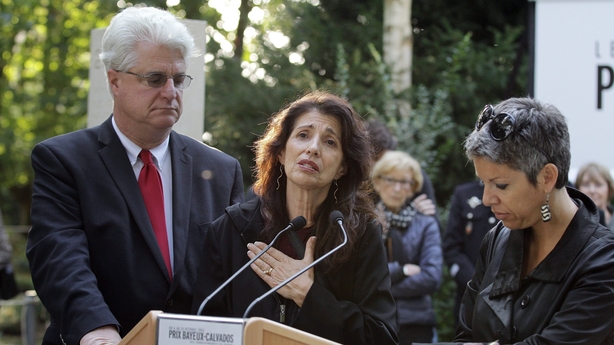Militants of the Islamic State group have advanced deeper into the Syrian town of Kobane on the Turkish border.
A group monitoring the situation said militants had taken almost complete control of an area where the local Kurdish administration is based.
"They have taken at least 40% (of the town)," Rami Abdulrahman, who runs the Syrian Observatory for Human Rights, said.
Tony Blinken, Deputy US National Security Adviser, echoed this figure, expressing fears that IS forces may capture the town.
Islamic State fighters were now in almost complete control of the "security quarter", which is home to the administrative buildings used by the local government, he said.
The US-led coalition has carried out two air strikes against IS in Kobane today.
Conflict has been ongoing since the militant group breached Kobane's defences earlier this week.
If jihadists capture the town, they will have unbroken control of a long stretch of the Syrian-Turkish border.
The United States and its allies, including Gulf states, have conducted more than 130 air strikes in Syria against IS militants since 22 September.
It is the biggest show of Arab support for US-led military action in the Middle East since the 1991 Gulf War.
In Turkey, 31 people have been killed and 360 injured over the past four days in violent protests led by pro-Kurdish demonstrators against the government's policy on Syria.
According to Turkey's interior minister two police men were also killed in the city of Bingol, along with five "terrorists" suspected of killing the police men.
The UN envoy for Syria has called on Turkey to allow volunteers to cross the Syrian border to prevent Islamic State fighters carrying out a massacre in Kobane, where 500-700 people, mostly elderly, were sheltering.
"Everybody should do whatever they can to stop this," Staffan de Mistura told a news conference in Geneva.
"I hope we will not see people beheaded," he added.
Need to negotiate with IS, says murdered reporter's father
The father of James Foley, the US reporter murdered by Islamic State militants, said he believed governments would have to negotiate with the extremists "eventually".
Speaking to French radio, John Foley said: "This situation is not going to be solved by military intervention."
He added that it costs nothing to talk to the militants who continue to advance across large parts of Iraq and Syria.
Yesterday, Mr and Mrs Foley attended the announcement of the Bayeux prize for war reporting, a memorial for 113 journalists who have been killed over the past 18 months.

James Foley, who worked for US media group GlobalPost, Agence France Presse (AFP) and others, was kidnapped in northern Syria in November 2012.
A video of his murder was published in August of this year.
"These people need to be understood," said his mother Diane. "I think we need to talk with them, we need to study them."
James Foley's parents said they believed the US government had tried very hard "to find a way to free our son".
Mrs Foley had previously told US media she felt the family's "efforts to get Jim freed were an annoyance" to Washington.
Despite their loss, the Foleys urged reporters to continue their work in war zones.
"One of the problems is if we allow these terrorists to prevent journalists from going into these areas," said Mr Foley.

